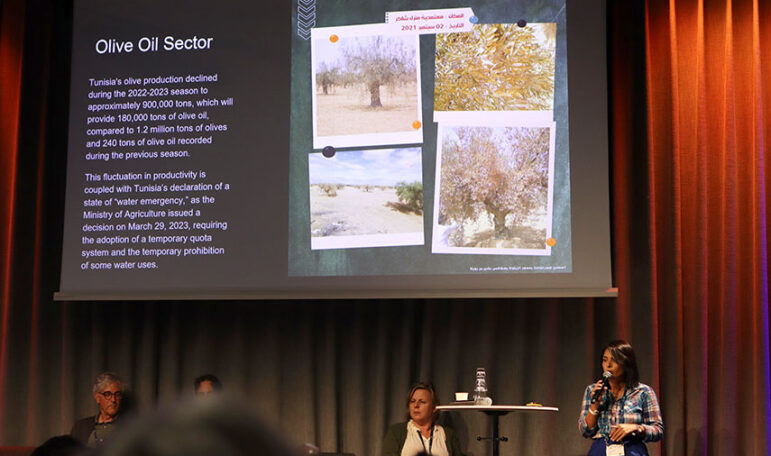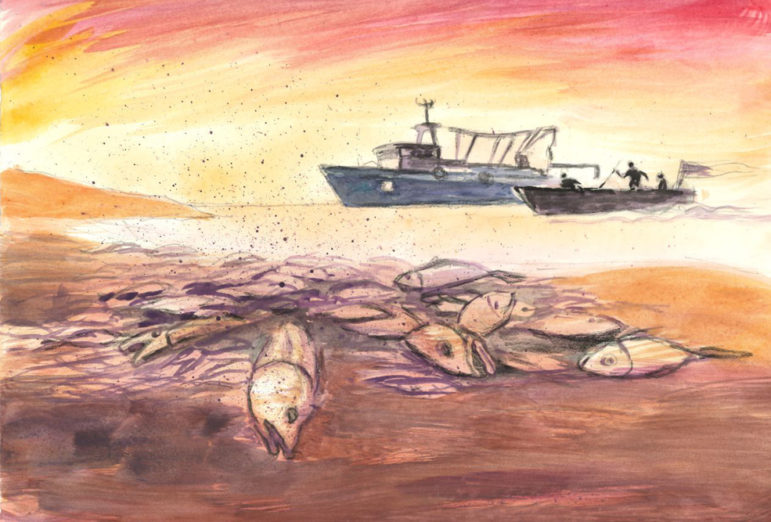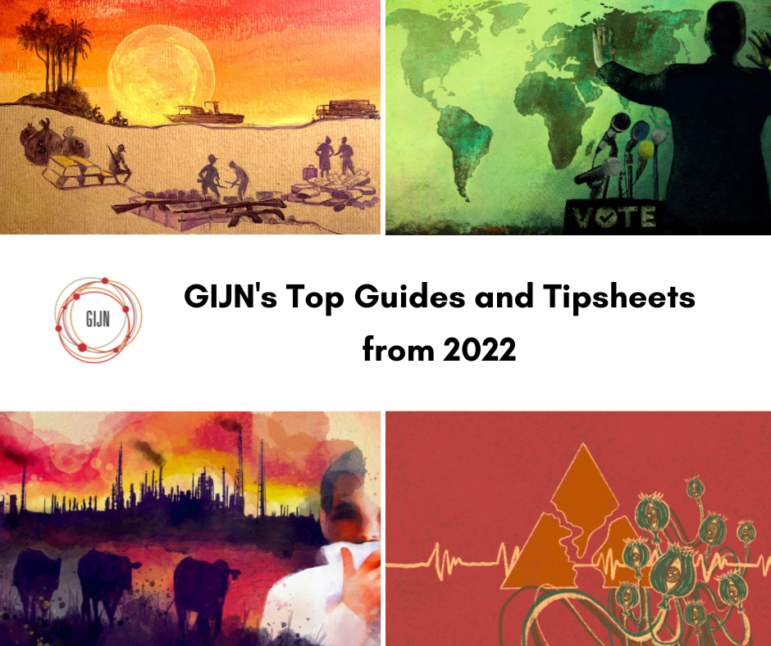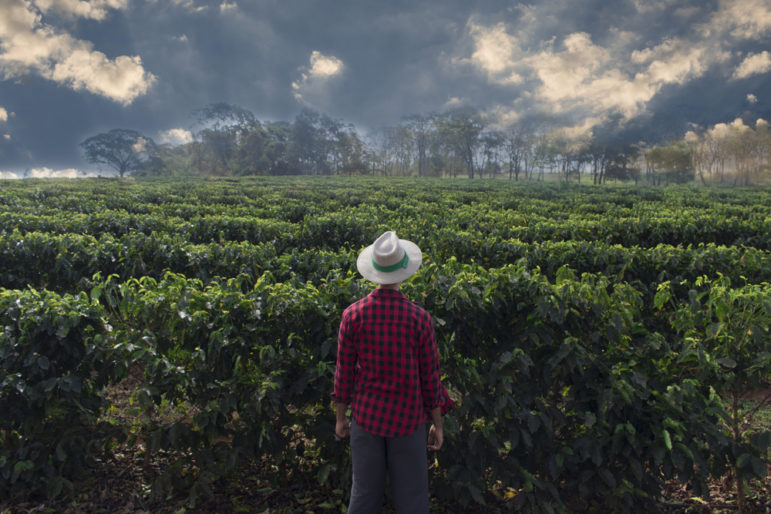

Alqatiba's Ramha Al Behi discusses her reporting on food production with a GIJC23 panel on investigating food and agriculture. Image: Wolf France for GIJN
Power and Control: Investigating Food Supply and Agriculture Amid Climate Change
Writing about food and agriculture is writing about power, noted Mark Schapiro, lecturer at University of California – Berkeley’s Graduate School of Journalism and author of “Seeds of Resistance: The Fight to Save Our Food Supply.”
“You’re writing about who controls the mechanisms by which you get the most essential ingredient of all life, which is food, so there are enormous stakes,” said Schapiro, speaking at a session on investigating food and agriculture at the 13th Global Investigative Journalism Conference (#GIJC23).
The conference panel — which included Philip Jacobson, investigative journalist for Mongabay; Rahma Al Behi, head of international investigations for Tunisian digital magazine Alqatiba; and panel moderator Bibi van der Zee, assistant editor for the Guardian’s environment desk — shared experiences and tips from their investigations into food and agriculture production and supply chains. They noted that control over these chains gives the food and agriculture industry huge influence — especially when the prospect of feeding the world population is at risk due to climate change.

Mark Schapiro, Philip Jacobson, and Rahma Al Behi (left to right) were panelists at the GIJC23 session on investigating food and agriculture. Image: Wolf France for GIJN
Drying Out a Country
Rahma Al Behi, of Alqatiba, explained how inequalities in olive and tomato growing are endangering the livelihood of farmers in Tunisia — especially women working in the agricultural sector, who often lack decent working conditions and labor protection.
Tunisia’s fresh water supplies are dwindling, and, with the Sahara desert covering a large swath of the country, is considered highly vulnerable to climate change, particularly from increased temperatures and aridity, decreased precipitation, and desertification.
Alqatiba’s investigation explained how land ownership and food production in Tunisia is shifting from local farmers to European companies and wealthy investors attracted by tax benefits and looser chemical-use regulations than the EU. The tomatoes and olive oil produced in Tunisia are then shipped mainly to European markets — growing the produce in Tunisia allows these industries to avoid EU regulations.
Tunisia’s estimated average revenue per year for tomato exports — according to the National Observatory of Agriculture — is around 140 million dinars (US$43 million). Meanwhile, Al Behi noted, growing one tomato plant can require several liters of water each day — and water depletion in Tunisia has led to farmers digging random wells in search of water, which seriously affects the water table.
Al Behi and her team used immersive journalism and in-depth interviews with farmers to gather information on how rural workers were struggling; the open sources they gathered were mostly research and policy documents published by the following bodies:
- The International Olive Council
- The United Nations
- The National Observatory of Agriculture
- Institute of Statistics in Tunisia
- Tunisian Competition Council
Illegal Shark Fishing
Mongabay investigative journalist Philip Jacobson also relied on immersive interviews when he investigated illegal shark fin fishing by a Chinese fishing company. The first challenge, in fact, was finding interviewees. Reports about human trafficking in the Asian fishing industry had already been published, and a crew had been detained in Indonesia for shark fin fishing.
“The question we set out to answer: ‘Was the [fishing vessel] a bad apple and the captain unfit, or were the labor abuses and wildlife crimes widespread and systematic across the fleet of 35 boats?’” said Jacobson.
Once the team found a list of the repatriated Indonesian fishermen, Jacobson took on the time-consuming task of finding as many as he could on Facebook, where friend lists were also useful. But instead of contacting them on Facebook, Jacobson turned to WhatsApp, where he knew they would be more likely to answer. Finding a WhatsApp number for a Facebook account was an additional hurdle to overcome.
“Once you talk with the deckhands, how do you establish the facts of what happened?” asked Jacobson. “In my opinion, this is the really interesting part.” Again, the deeper question was: “Is illegal shark fishing systematic?”
All deckhands interviewed said they observed shark finning — the practice of removing fins and then discarding the injured sharks, now unable to survive, back into the ocean.
Because some deckhands even remembered how many sacks of shark fins they filled during their journey, and roughly how much each sack weighed, Mongabay was able to use the methodology behind the World Wildlife Fund’s Sharkulator tool (first devised to estimate how many sharks are saved for each bowl of shark fin soup not consumed) to process these figures — to provide an estimate of how many sharks could be finned by just one of these ships.
Further interviews suggested that the practice was systematic across the fleet. So, if, say, a single boat in the fleet of 35 was responsible for finning 31,000 sharks a year, the total number across all boats might be close to a staggering 1 million sharks finned per year.
Following this investigation, the US Treasury Department imposed sanctions on the fishing company. It is not clear if the Chinese government punished any of the fleet captains, company employees, or owners.
Pushing Back against the Seed Oligopoly
Just a handful of corporations control 50% of the world’s seed production market — an oligopoly that gives them a huge amount of control over global food production and supply.
“What is the common thread between these companies? They’re all chemical companies,” said Schapiro. “Their primary business is creating agricultural chemicals, and they have a side division that creates these seeds. This means the seeds are created… to be dependent on the chemicals produced by this same company,” he added.
The biggest problem with this business model, Schapiro noted, is that engineered plants are more vulnerable to climate change: In fact, the agricultural industry’s production of seeds, with its artificially reduced genetic diversity, is imperiled by current environmental crises.

UC Berkeley journalism lecturer Mark Schapiro addresses his work looking into agribusiness and the global seed production market. Image: Wolf France for GIJN
But journalists looking into this field — who are likely to be bombarded by agribusiness public relations departments — might not get to the core of these issues easily. To cut through agricultural industry spin, Schapiro suggested investigative journalists do the following:
- Read agricultural trade and farmer publications — such as Successful Farming. Schapiro described trade publications as an underrated and valuable resource for journalists reporting on topics related to a specific trade — not only food and agriculture.
- Interview scientists and read academic journals related to food and agriculture — the main sources for countering arguments made by the more powerful players in the industry, who have usually crafted an exculpatory narrative and arguments that defend their interests.
- Interview members of civil society organizations that conduct activism in the field, or are familiar with your topic.









